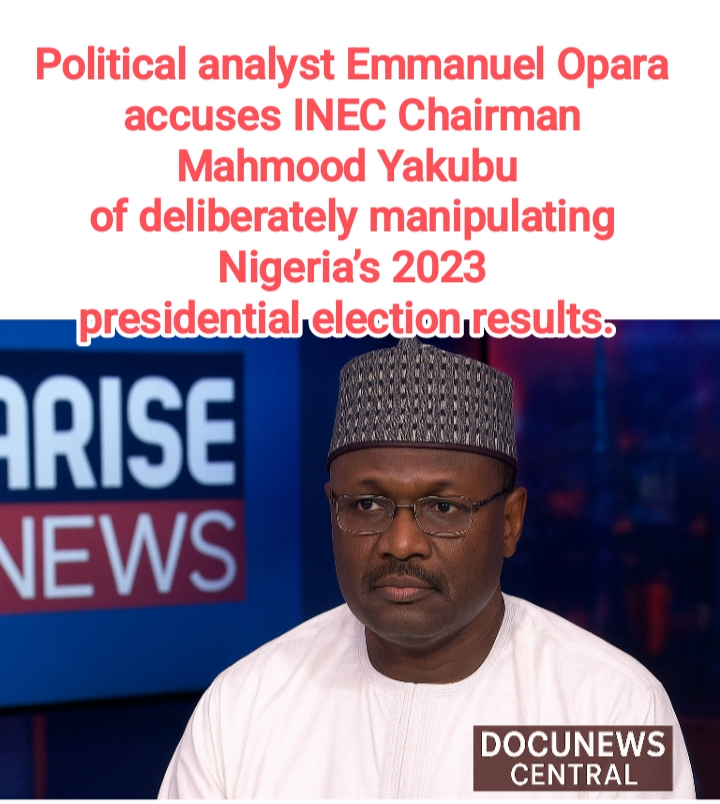
Opara Slams INEC Chairman Yakubu Over 2023 Election: “He Should Let His Conscience Judge Him”
By DocuNews Central | October 11, 2025
Introduction: A Renewed Debate Over Electoral Credibility
In a recent interview on Arise News held on October 8, 2025, Nigerian political analyst Emmanuel Opara launched a strong criticism against the Chairman of the Independent National Electoral Commission (INEC), Professor Mahmood Yakubu, accusing him of overseeing an election process that shattered public confidence. Opara’s comments have reignited discussions about the transparency and credibility of Nigeria’s 2023 general elections, an event that remains one of the most controversial in the nation’s democratic history. read also Why I don’t want to stay in Sokoto prison, Kanu tells court.
According to Opara, the INEC chairman failed to uphold the moral and constitutional responsibility entrusted to him, alleging that deliberate manipulation and selective transmission of results compromised the integrity of the presidential election.
Opara’s Explosive Allegations Against INEC Leadership
During the Arise News program, Opara didn’t mince words. He alleged that INEC received full financial and logistical support to conduct a credible election. However, he argued, the 2023 polls were marred by “massive irregularities, fraud, and deliberate technical manipulation.”
“He transmitted results for the National Assembly but claimed there was a technical hitch during the presidential election. That was a deliberate manipulation,” Opara said. “He should let his conscience judge him.”
The accusation directly challenges INEC’s claim that the delay in uploading presidential results was caused by a technical glitch on its result-viewing portal (IReV). Many Nigerians, as well as local and international observers, expressed concern that the failure undermined public trust and altered the credibility of the presidential election outcome.
A Question of Transparency and Accountability
For Opara, the integrity of the electoral process lies at the heart of democracy. He asserted that no excuse could justify why results for other elections — including the Senate and House of Representatives — were transmitted smoothly, while presidential results experienced a sudden breakdown.
He further described Yakubu’s defense as “a calculated ploy to manipulate public opinion,” insisting that “democracy can never thrive where leadership lacks moral conscience.” Observers have noted that Opara’s remarks echo sentiments shared by civil society organizations and political stakeholders who have called for electoral reform and leadership accountability in Nigeria’s electoral management system.
Abia State: A Model of Electoral Integrity
Contrasting the alleged irregularities in the national polls, Opara praised Abia State as a “beacon of electoral integrity.” He highlighted the courage of a female returning officer who, despite immense pressure, refused to compromise the people’s mandate during the 2023 elections. for more verified news like ours visit http://legit.com
“Her decision to do the right thing showed that one person’s courage can restore the people’s faith in democracy,” Opara said.
Since then, he added, Abia has seen visible governance progress, a reflection of leadership born out of genuine electoral choice rather than manipulation.
National Reactions: Divided Opinions and Lingering Doubts
Following Opara’s statements, public reaction has been sharply divided. Some Nigerians hailed his courage to speak truth to power, while others cautioned against what they described as politically motivated accusations.
According to The Guardian Nigeria and Premium Times, several analysts believe that Opara’s remarks mirror a broader frustration among citizens who still question INEC’s transparency in the use of its Bimodal Voter Accreditation System (BVAS) and the IReV platform.
Electoral Integrity and the Future of Democracy in Nigeria
The 2023 elections were expected to be a landmark event — showcasing Nigeria’s technological leap in election management. However, the controversy surrounding the IReV portal dented that vision. Opara’s accusations underscore a deeper concern: can Nigerians trust their votes to count in future elections?
Democracy thrives not just on the right to vote but also on the transparency of how votes are counted and declared. Analysts argue that without visible accountability from institutions like INEC, citizens may continue to lose faith in the system.
The Moral Dimension of Leadership
One of Opara’s most striking remarks was not about politics but about conscience. “He should let his conscience judge him,” he declared — a statement that cuts beyond electoral data or legal frameworks.
For Opara, moral leadership forms the foundation of institutional credibility. He implied that Professor Yakubu’s legacy will be defined not by technical excuses but by how his actions affected national trust in democracy.
Comparative Insights: Lessons from Abia State’s Example
Opara’s emphasis on Abia State offers a valuable perspective. The state’s election process, according to reports by Channels TV and ThisDay, demonstrated that integrity at the individual level can safeguard democracy even when institutional systems fail.
The Role of Media and Public Discourse
Media organizations like Arise News, Premium Times, and The Guardian Nigeria have played crucial roles in keeping the conversation on electoral transparency alive. The press serves as both watchdog and amplifier — ensuring that allegations like Opara’s remain within the public consciousness, prompting continued demands for reform.
DocuNews Central emphasizes that public accountability remains the cornerstone of democracy. When citizens, journalists, and civic organizations demand transparency, institutions are compelled to perform better.
Rebuilding Public Confidence in INEC
- Publish a comprehensive audit report detailing what went wrong with the IReV system during the 2023 elections.
- Enforce stricter internal oversight to prevent future lapses in electronic transmission.
- Engage openly with citizens, civil society, and the media to rebuild credibility.
- Hold officials accountable for negligence or misconduct to demonstrate institutional responsibility.
Conclusion: The Call for Conscience and Accountability
Opara’s fiery remarks have once again placed INEC’s leadership under public scrutiny. Beyond political rhetoric, his message underscores a moral truth — democracy cannot thrive without integrity.
The 2023 elections, despite their logistical success, left emotional and institutional scars that still need healing. As Nigeria prepares for future elections, the challenge remains the same: ensuring that every vote counts, that every mandate reflects the will of the people, and that those in power act with clear conscience and moral conviction.
© 2025 DocuNews Central. All Rights Reserved.












Will they hear? People who don’t have conscience